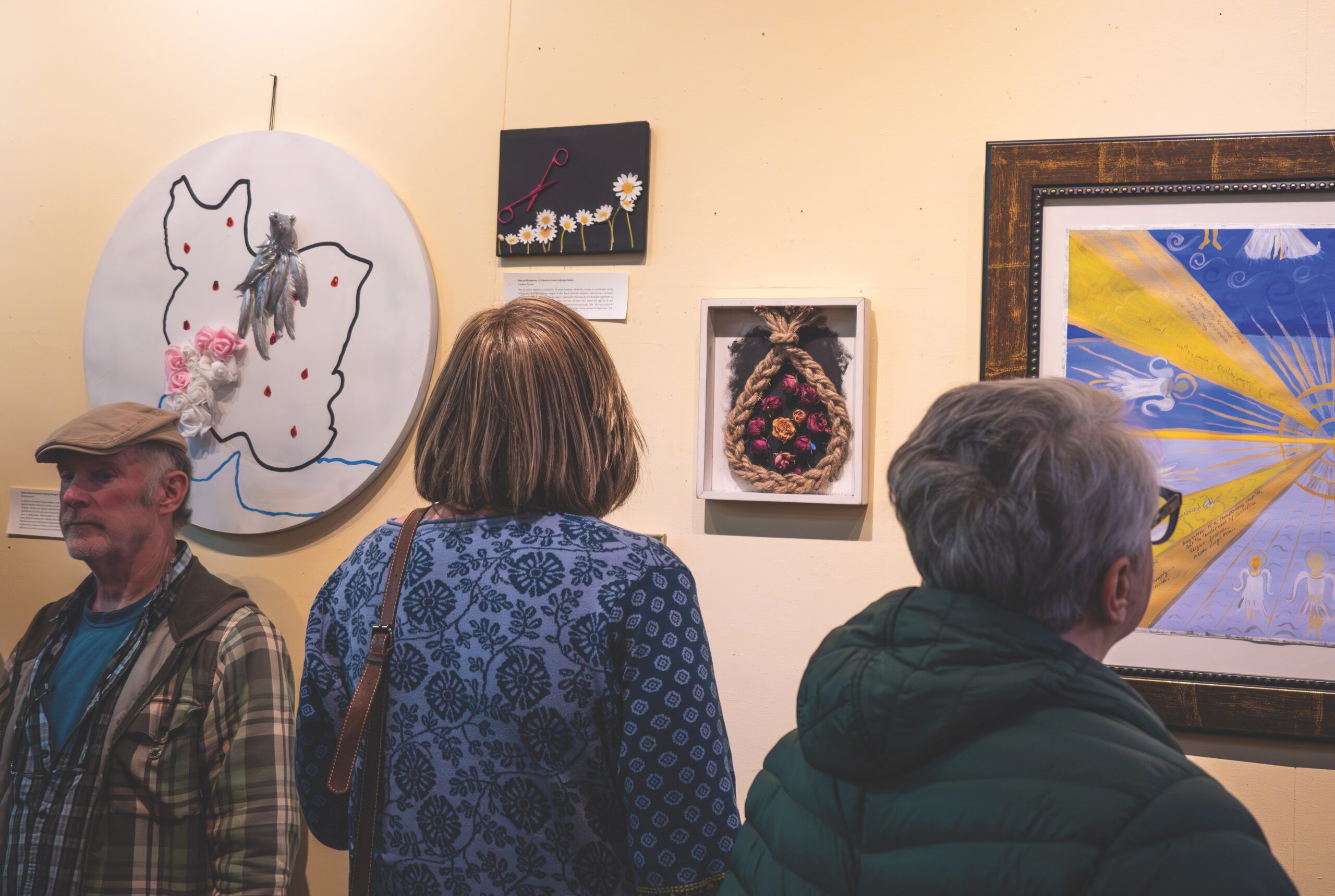#OurStoryIsOne: New Lamarche exhibit calls attention to Baha’i women and a global struggle for equality
March 1, 2024
 Alex Spear
Alex SpearOn Tuesday, local Baha’i activists Parivash Rohani and her husband Nasser Rohani held a reception for the new exhibit they curated in Smith Union’s Lamarche Gallery, a collection of collages, paintings, sculpture and a tapestry promoting the global #OurStoryIsOne campaign. The campaign honors ten Baha’i women executed for their beliefs in Shiraz, Iran in 1983 and calls attention to the ongoing persecution of women of the Baha’i faith today. The on-campus exhibit aims to generate conversation about women’s rights in Iran and worldwide.
The #OurStoryIsOne movement was launched last year by the Baha’i International Community (BIC) in commemoration of the 40th anniversary of June 18, 1983, when the Islamic Republic of Iran executed the ten Baha’i women for their faith and refusal to convert to Islam. To support the campaign, the Rohanis called upon local artists to create a gallery of around 20 pieces of art honoring the women. Many of the works directly reference or portray the women, also known as the Ten Women of Shiraz.
“[The women’s] story of sacrifice and resilience reminded [the local artists] of a story of somebody they knew personally in their own life,” Parivash Rohani said.
Parivash Rohani has a deep personal connection to the cause: While she was a university student, she knew the ten women as peers and teachers before she fled Iran to India amid the Iranian Revolution in 1979. Her home was among those burned and searched by Iranian authorities in 1983, meaning that she might have been one of the women killed had she not fled. Parivash later moved to California in 1986 and then to Maine shortly thereafter, where she has carried the weight of their deaths for decades.
“When the [BIC] announced the global campaign, I felt like now I’ll have tools to heal” she said. “Every time I go and talk to someone about the campaign, or every time the universities respond, or galleries respond, or libraries reach out or people want to interview me, I feel that I’m healing at the same time.”
The installation came to Bowdoin under the sponsorship of the Department of Religion, the Rachel Lord Center for Religious and Spiritual Life, and the Sexuality, Women, and Gender Center (SWAG). Assistant Professor of Religion and Asian Studies Claire Robison and Director of SWAG Natalie Turrin spearheaded the event.
“I feel like often [faculty] can get sequestered in our academic spaces or we just teach classes and academic content, but don’t necessarily participate in broader events around campus,” Robison said. “I’ve been really excited to have it as an opportunity where I’m working with Natalie … to bring about this very student-oriented exhibition.”
Robison highlighted the event as part of Women’s History Month and how the #OurStoryIsOne movement relates to the current protests for women’s rights in Iran, galvanized in part by the 2022 death of Mahsa Amini, who died while in the custody of Iran’s Guidance Patrol, which arrested her for allegedly failing to wear a hijab in public.
“[The] protest movement has brought people of varying genders, religions, and ethnic backgrounds together to support freedom and life for all. #OurStoryIsOne echoes this protest movement by remembering the lives of earlier women who fought for a similar cause,” Robison wrote in an email to the Orient.
Nasser Rohani emphasized how #OurStoryIsOne promotes women’s rights not just for Iranians but also all around the world by advocating for universal human values of justice and equality. No community’s issues are separate from the common cause of humanity, he said, adding that Baha’i women’s persecution has not always been treated that way.
“When these women were hanged, the majority of Iranians, men and women … said ‘it is not our problem. It is Baha’i’…. But today, and just last year, when this women’s movement happened in Iran, they went through the same thing that those women 40 years ago went through,” Nasser Rohani said.
Martha Stein, executive director of Portland-based Hope Acts, which provides support to asylum seekers in Maine, attended the reception because she came to know Parivash Rohani as an activist and nurse. Stein echoed the universal compassion for all humanity that the Rohanis hope the movement will encourage.
“It’s people like Parivash who remind us that these horrible things are not just happening to, or have happened to, just blobs of people out there—that they were human beings, they were women, they were mothers, sisters” Stein said.
Parivash and Nasser’s exhibit visited the University of Southern Maine on February 9, and it will appear next at First Parish Church in Portland in April for their monthly First Friday Art Walk. The Rohanis have also written a play telling the story of the 10 Baha’i women of Shiraz, as witnessed from the gallows, and encourage any Bowdoin students interested to reach out to them.

Comments
Before submitting a comment, please review our comment policy. Some key points from the policy: